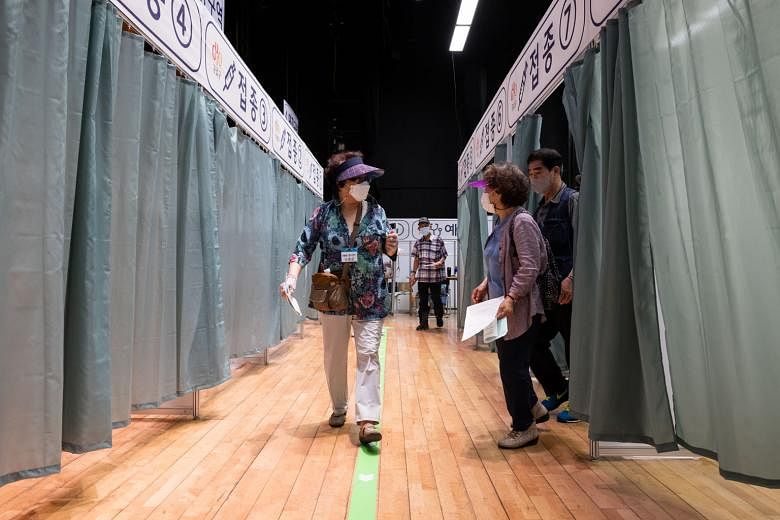Some 100 days after rolling out its Covid-19 vaccination programme, South Korea is seeing high take-up rates, despite initial public scepticism, and is on track to achieve herd immunity by November.
A record-high 875,000 people had their jabs on Monday, bringing the total number who have had their first shots to 8.45 million, or 16.3 per cent of the 51.8 million population. The daily figure has been rising since May 27, a day after the government dangled incentives such as allowing those who have had one jab to go outdoors without a mask and letting them have family gatherings of more than four people from July.
This move to encourage mass vaccination has worked. A large number of people - 640,000 - got their first shots on May 27 - more than double the previous record of 307,000 on April 30.
President Moon Jae-in voiced optimism on Monday that more than 14 million people can get their first jabs by end-June - higher than the earlier estimated 12 million - and 36 million by September. Some 36 million, or 70 per cent of the population - must be fully vaccinated with two doses by November to achieve herd immunity. The figure was 2.29 million as at yesterday.
Speaking at an inter-agency meeting, Mr Moon said the goal is to enable people to have a "safe and comfortable" summer vacation and gather with family without wearing masks during the Chuseok holiday in September.
South Korea reported 435 new cases of the coronavirus yesterday, bringing the total number of infections to 145,091. Daily figures have remained in the 400-700 range for the past few weeks.
Launched on Feb 26, the vaccination programme has faced hurdles such as acquisition delay and supply shortage. There were also problems with the country's first available AstraZeneca vaccine, which was suspended temporarily due to links to a rare type of blood clot.
The supply shortage has since eased with different types of vaccines coming in, such as one million doses of Johnson & Johnson's Janssen vaccine supplied by the United States for the military, to be administered from tomorrow.
Inoculations with Moderna's vaccine could start as early as next week, the health authorities say.
South Koreans are not allowed to choose their vaccines.
Dr Choi Jae-wook, a preventive medicine specialist from Korea University's College of Medicine, said the government is on target to inoculate more than 80 per cent of its elderly population by end-June.
"People were still sceptical a month ago, but the mood has changed and many people are trying to register for vaccinations," he told The Straits Times.
He attributed this to more types of vaccines available, not just AstraZeneca's which people were wary of due to blood clots and lower efficacy rate - 70 per cent compared with Pfizer's 95 per cent and Moderna's 94 per cent.
However, more needs to be done to address the issue of compensation for severe side effects and deaths linked to vaccination, to further ease people's concerns about getting jabbed, said Dr Choi.
The health authorities yesterday said they will provide vaccination stickers from late this month for people who are fully vaccinated to attach to their identity cards.
This, in addition to digital and paper records, is to make it easier for the elderly who are less tech savvy and may forget to take their vaccination papers when they go out.
Teacher Bryan Lee, 60, is waiting for his jab and he does not mind getting any brand of vaccine.
"It will be good to choose the brand but each has its own strength and weakness and the side effects vary, so I think it doesn't really matter," he told ST. "I just want to get vaccinated right away, in order not to get Covid-19."

